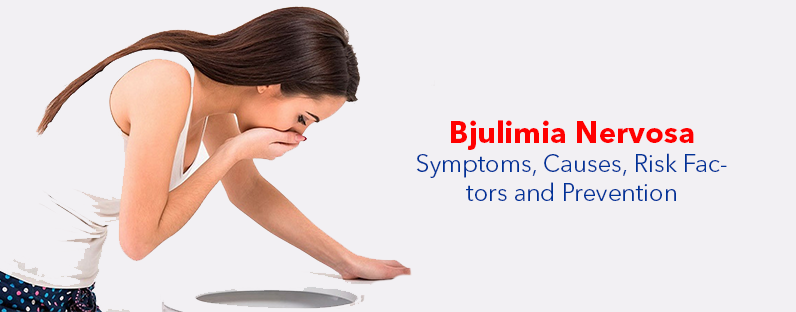Bulimia Nervosa – Symptoms, Causes, Risk Factors and Prevention
Overview
Bulimia (boo-LEE-me-uh) Nervosa is a severe, often life-threatening eating disorder generally called bulimia. People with bulimia that secretly binge — consuming large amounts of food with a lack of control over consuming — and then purge, trying to unhealthily get rid of the extra calories.
People with bulimia may use different methods to rid themselves of calories and prevent weight gain. For instance, you can frequently vomit or misuse of laxatives, weight loss supplements, diuretics or enemas after bingeing. Or you can use other ways of getting rid of calories and avoiding weight gains, such as fasting, strict diet or regular exercise.
When you have bulimia, your weight and body shape probably concern you. You should severely and harshly blame yourself for your self-perceived shortcomings. Because bulimia can be hard to resolve as it is linked to self-image — and not just about food. Yet good therapy may make you feel better about yourself, adopt healthy eating habits and reverse severe complications.
Symptoms
Bulimia signs and symptoms may include:
- Concerned about body form and weight Living in fear of gaining weight
- Regular episodes of abnormally high quantities of food eaten in one sitting
- Feeling a loss of control during bingeing — like you can’t stop eating or can’t control what you eat
- Use of laxatives, diuretics or enemas after eating when no need occurs
- Fasting, calorie restriction or avoiding other foods in binges
- The inappropriate use of dietary supplements or herbal products for weight loss
If you have experienced any signs of bulimia, seek medical attention as soon as possible. Bulimia can have serious effects on your health if left untreated.
When to see a doctor
The seriousness of bulimia is determined by the number of times a week you detox, usually for a minimum of three months at least once a week.
Speak to your primary care physician or mental health professional about the signs and thoughts of bulimia. If you’re reluctant to seek treatment, confide in someone about what you’re going through, whether it’s a friend or loved one, a teacher, a faith leader, or someone else you trust. He or she can help you take the first steps toward successful treatment for bulimia.
Helping a loved one with bulimia symptoms
If you believe a loved one may have bulimia symptoms, have an open and honest discussion of your concerns. You can’t force anyone to seek professional care, but you can offer support and encouragement. You may even help find a trained doctor or specialist in mental health, schedule an appointment and even agree to go along.
Because most people with bulimia are usually normal weight or slightly overweight, something is wrong may not be apparent to others. Red flags noticeable by family and friends include:
- Constantly worrying or complaining about being fat
- Having a distorted, excessively negative body image
- Eating excessively large amounts of food in one sitting repeatedly, particularly foods that the person would normally avoid
- Strict dieting or fasting after binge eating
- Not wanting to eat in public or in front of others
- just after feeding, during meals, going to the bathroom for a long time
- Exercising too much
- Having sores, scars or calluses on the knuckles or hands
- Having damaged teeth and gums
- Changing weight
- Swelling in the hands and feet
- Facial and cheek swelling from enlarged glands
Causes
The exact cause of bulimia is unknown. Several factors, including genetics, biology, emotional health, social expectations and other problems, may play a role in eating disorders.
Risk factors
Women and girls are more susceptible to bulimia than men and boys are. Bulimia sometimes occurs at late adolescence or early adulthood.
Factors which can increase your bulimia risk may include:
Biology: People with first-degree relatives (siblings, parents or children) with an eating disorder may have a greater risk of having an eating disorder, indicating a potential genetic link. As a child or teen being overweight can increase the risk.
Psychological and emotional issues: Psychological and emotional problems, such as depression, anxiety disorders or substance use disorders are closely linked with eating disorders. People with bulimia may feel negative about themselves. Traumatic events and environmental stress can in some cases contribute factors.
Dieting: Individuals who diet have an increased chance of having eating disorders. Many people with bulimia severely calories in binge episodes, which can cause an impulse to consume and purge binge once again. Other bingeing triggers might include stress, poor body self-image, food and boredom.
Complications
Bulimia can cause many severe problems, and even life-threatening ones. Complications may include:
- Negative self-esteem and problems with relationships and social functioning
- Dehydration, which can cause severe medical complications, such as kidney failure
- Heart issues, including irregular heartbeat or heart failure
- Severe tooth decay and gum disease
- Absent or irregular periods in females
- Digestive problems
- Anxiety, depression, personality disorders or bipolar disorder
- Misuse of alcohol or drugs
- Self-injury, suicidal thoughts or suicide
Prevention
While there is no sure way to avoid bulimia, before the condition gets worse you can direct others toward better conduct or medical care. Here’s how you can help:
- Support and improve your children’s healthy body image, whatever their size or shape. Help them establish confidence in ways other than their looks.
- Have regular, enjoyable family meals.
- Avoid talking about weight at home. Focus instead on having a healthy lifestyle.
- Discourage dieting, especially when it involves unhealthy weight-control behaviours, such as fasting, using weight-loss supplements or laxatives, or self-induced vomiting.
- Contact your primary care provider. He or she will be able to recognize the early signs of an eating disorder and help prevent it from progressing.
